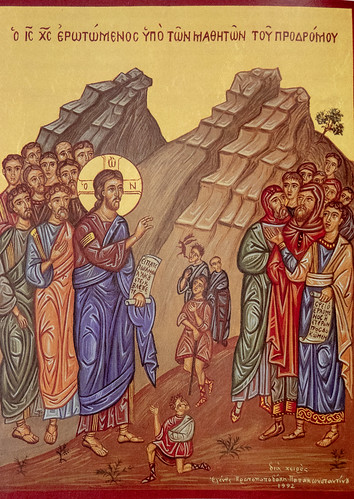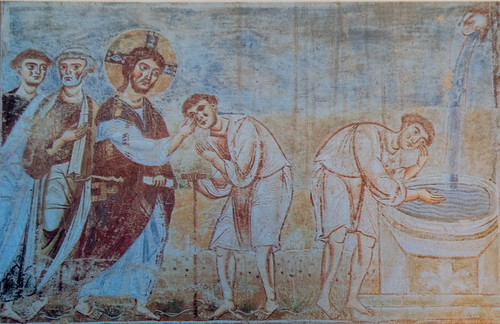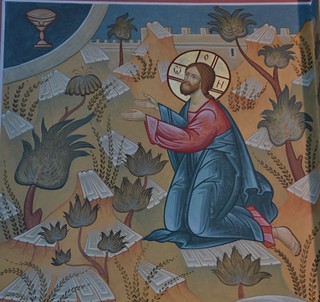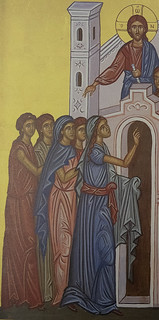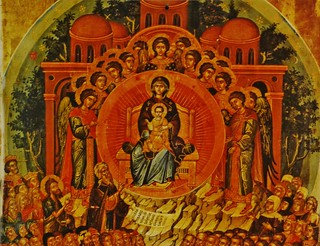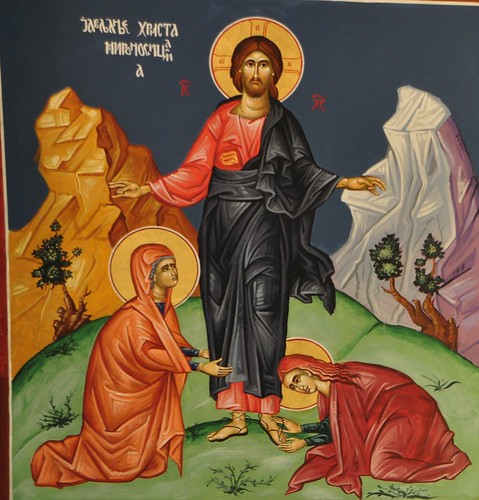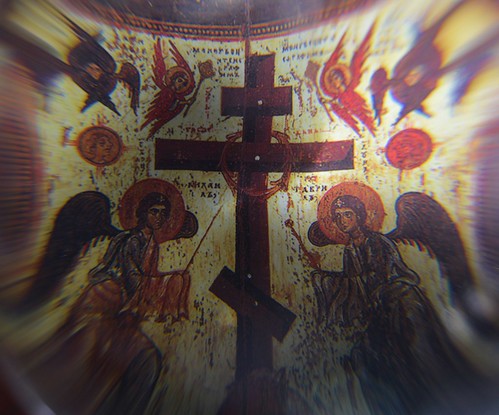The Gospel lesson of Mark 9:17-31:
 Then one of the crowd answered and said, “Teacher, I brought You my son, who has a mute spirit. And wherever it seizes him, it throws him down; he foams at the mouth, gnashes his teeth, and becomes rigid. So I spoke to Your disciples, that they should cast it out, but they could not.” He answered him and said, “O faithless generation, how long shall I be with you? How long shall I bear with you? Bring him to Me.” Then they brought him to Him. And when he saw Him, immediately the spirit convulsed him, and he fell on the ground and wallowed, foaming at the mouth. So He asked his father, “How long has this been happening to him?” And he said, “From childhood. And often he has thrown him both into the fire and into the water to destroy him. But if You can do anything, have compassion on us and help us.” Jesus said to him, “If you can believe, all things are possible to him who believes.” Immediately the father of the child cried out and said with tears, “Lord, I believe; help my unbelief!” When Jesus saw that the people came running together, He rebuked the unclean spirit, saying to it: “Deaf and dumb spirit, I command you, come out of him and enter him no more!” Then the spirit cried out, convulsed him greatly, and came out of him. And he became as one dead, so that many said, “He is dead.” But Jesus took him by the hand and lifted him up, and he arose. And when He had come into the house, His disciples asked Him privately, “Why could we not cast it out?” So He said to them, “This kind can come out by nothing but prayer and fasting.” Then they departed from there and passed through Galilee, and He did not want anyone to know it. For He taught His disciples and said to them, “The Son of Man is being betrayed into the hands of men, and they will kill Him. And after He is killed, He will rise the third day.”
Then one of the crowd answered and said, “Teacher, I brought You my son, who has a mute spirit. And wherever it seizes him, it throws him down; he foams at the mouth, gnashes his teeth, and becomes rigid. So I spoke to Your disciples, that they should cast it out, but they could not.” He answered him and said, “O faithless generation, how long shall I be with you? How long shall I bear with you? Bring him to Me.” Then they brought him to Him. And when he saw Him, immediately the spirit convulsed him, and he fell on the ground and wallowed, foaming at the mouth. So He asked his father, “How long has this been happening to him?” And he said, “From childhood. And often he has thrown him both into the fire and into the water to destroy him. But if You can do anything, have compassion on us and help us.” Jesus said to him, “If you can believe, all things are possible to him who believes.” Immediately the father of the child cried out and said with tears, “Lord, I believe; help my unbelief!” When Jesus saw that the people came running together, He rebuked the unclean spirit, saying to it: “Deaf and dumb spirit, I command you, come out of him and enter him no more!” Then the spirit cried out, convulsed him greatly, and came out of him. And he became as one dead, so that many said, “He is dead.” But Jesus took him by the hand and lifted him up, and he arose. And when He had come into the house, His disciples asked Him privately, “Why could we not cast it out?” So He said to them, “This kind can come out by nothing but prayer and fasting.” Then they departed from there and passed through Galilee, and He did not want anyone to know it. For He taught His disciples and said to them, “The Son of Man is being betrayed into the hands of men, and they will kill Him. And after He is killed, He will rise the third day.”
This Gospel lesson is centered on an idea of faith or belief: what is faith? how does belief manifest itself? and what power can faith bring into one’s life? Unfortunately we can be tempted to think faith is just a way to get miracles into our life, kind of like a faucet which we can turn on and off to get miracles to come out whenever we are thirsty for them. Or some in Christianity like to see themselves as miracle workers who can dispense miracles at will, so they see themselves as being the faucet which controls the powers of God to miraculously change the normal and mundane events of life. Jesus for His part dispels such shallow understandings of miracles, and always uses miracles to get us to see and think beyond this world, to look for the Kingdom of God – not to look for miracles in this world but to open the eyes of our heart to see beyond this world. Otherwise we are at risk to be so enamored with the glamour of miracles that we seek out the miracles rather than the God who gives ever good and perfect gift. Miracles it turns out are nothing but signs that the Kingdom exists, but miracles are not the main point, rather they point to what is truly important – namely the Kingdom of God. If we wonder why there aren’t more miracles in our lives, it is because we aren’t looking for the Kingdom to which the miracles point. It is because we wrongly want the miracles rather than the reality to which they point.

Miracles not only point to the Kingdom of God, they invite us to respond to the Kingdom, and in the Gospel, the response to the Kingdom is repentance not seeking miraculous powers or more miracles.
The seventy returned with joy, saying, “Lord, even the demons are subject to us in your name!” And he said to them, “I saw Satan fall like lightning from heaven. Behold, I have given you authority to tread upon serpents and scorpions, and over all the power of the enemy; and nothing shall hurt you. Nevertheless do not rejoice in this, that the spirits are subject to you; but rejoice that your names are written in heaven.” (Luke 10:17-20)
We can see in the Gospel lesson of Mark of Mark 9:17-31 that the ability to perform a miracle is not everything. The 12 Disciples are not able to overcome the one demon possessing the boy. Last Sunday, the Sunday of the Cross, we proclaimed the total destruction of all evil, of demons, and today we see the disciples stymied by one demon. Now we learn of the struggle we face in this world. The spiritual life is rightly described as spiritual warfare, and in warfare even if there is victory there can be casualties, dangers, defeats, even for the chosen saints. The Cross means victory for us, but we still must persevere in life. We are promised blessings in the world to come, the trouble is we are still in this world, a fallen and sinful world. Here we do not always find victory, joy and ease. We do find sickness, suffering, death, failure, frustration. Here the cross is something we must sometimes carry as a burden. Jesus says the lesson is we need to pray and fast, but we want the miracles without having to give up anything ourselves. The disciples were brokenhearted by their failure, but they aren’t the only failure in the Gospel lesson.

Jesus tells the dad of this sick boy: “If you can believe, all things are possible to him who believes.” Immediately the father of the child cried out and said with tears, “Lord, I believe; help my unbelief!” Here is the moment of metanoia in the dad – for up to this point he has accused the disciples of being failures – “I spoke to Your disciples, that they should cast it out, but they could not.” Suddenly, confronted by Jesus, he realizes the failure is his own – he has not believed it possible for anyone to help his son. The failure is not in the disciples alone, but the man must be willing to trust in God, work with God, not just dump it on God and blame God and his followers for the failure. The dad accepts his responsibility in what happens, he undergoes a conversion and begins to cooperate with God. The dad was demanding help but not praying, the dad’s heart had to be changed, he had to become a man of prayer, not just a man demanding that his wishes be granted, but a man humble enough to realize his own helplessness and his dependence on others for help.
And all of this helps us understand that faith as such is not a faucet which we turn on and off to get what we want. Faith is a relationship with God, a total life commitment to the God we are hoping in, trusting, believing and relying on. When we manage to live in relationship to God, then we have faith. Faith it turns out is also about our relationship with the entire Body of Christ, all believers, and how we relate to them.
At the beginning of Lent I commented that Israel in being called out of Egypt and into the desert was called to trust in the Lord, to put their faith in God, and not rely on the material resources that civilization could provide them. Israel had to renounce their dependence on the mighty Egyptian Empire to which they had become enslaved. Israel was not called to start a civil war to take over the empire, they were called to leave civilization and move into the hostile and inhospitable desert of desolation. They were called to abandon all that civilization had to offer them and to go into the desert where there is nothing awaiting them except for God. This is what Great Lent calls us to do – civilization and all its pleasures, foods, entertainment are all around us, but God calls us out of that and to look for God in the wilderness, where there is hunger and deprivation and self denial is necessary just to survive. In the desert, deprived of the comforts, the advantages of technology, of society, of civilization, we are confronted by whether we really trust God or not. Salvation is not going to come from the greatest and richest country in the world. Rather it comes from God. We have to find God and not become enticed by wealth and power of the nation.

We are to live in a covenant relationship with God, not seeking out miracles here and there, but adhering to faithfulness to God. Great Lent calls us away from all the “blessings” which we so love and says do you really want God, the Giver of every good and perfect gift, OR do you really just want the abundance? Would you give up God in a second if you could find abundance on your own? Do you only seek God for what you can extract from Him?
“When the Church calls us to her truth, she does not hold out some theoretical theses Which must be accepted in principle. She invites us to a personal relationship, to a ‘way’ of life which constitutes a relationship with God or leads progressively and experientially to a relationship with Him. This way transforms our entire life from individual survival to an event of communion. The Church is a body of communion, wherein the members live, not each one for himself, but each one in an organic unity of love with the rest of the members and with the head of the body, with Christ. ‘I believe in the truth of the Church’ means that I agree to be included in the ‘bond of love’ which constitutes it; I trust in the love of the saints and of God, and they accept me with faith and trust in my person.” (Christos Yannaras, ELEMENTS OF FAITH, p 14)
The faith that the dad needed in today’s Gospel lesson, the faith the disciples needed, the faith that we need is this relationship with God and admitting our dependence on God and need to trust God. Think about today’s Epistle reading:
“that … we might have strong consolation, who have fled for refuge to lay hold of the hope set before us. This hope we have as an anchor of the soul, both sure and steadfast, and which enters the Presence behind the veil, where the forerunner has entered for us, even Jesus, having become High Priest forever according to the order of Melchizedek. ” (Hebrews 6:18-20)

Hope it says is an anchor to the soul and it is this hope which enters the Presence in the Holy of Holies. Hope it turns out is a person, Jesus Christ. Christ is the way, truth and the life. Christ is our hope. Our faith it turns out is to be united to Christ with all our soul, mind, heart, body, strength. Faith, hope and trust all are ways that we relate to Christ our God, not mental contortions we use to extract from nature the things we crave. Faith is a living relationship with God.
St Isaac the Syrian says our life is a spiritual warfare for which we can be prepared to engage in:
“Before the war begins, seek after your ally . . . and before grievous things come upon you, pray, and in the time of your tribulations you will find Him, and he will hearken to you. Before you stumble, call out and make supplication … The ark of Noah was built in the time of peace, and its timbers were planted by him a hundred years beforehand. In the time of wrath the iniquitous perished, but the ark became the shelter for the righteous man.”
In Lent we endeavor to establish our relationship with God, to seek an ally in this world. Because Lent doesn’t keep us away from the world but prepares us to go back into the world with God in us daily always and in all ways. The journey into the desert for Israel was that time period they needed to prepare them as a people to enter into the Promised Land.

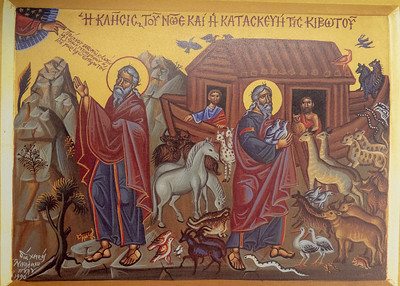





 “
“



 I remember a cartoon I saw once in which a mother tells her son, “I want you to mow the lawn and clean the garage today.” The son moans mightily and responds with great complaint saying, “Man, I can’t wait until I’m an adult, then I won’t have to do anything I don’t want to do!”
I remember a cartoon I saw once in which a mother tells her son, “I want you to mow the lawn and clean the garage today.” The son moans mightily and responds with great complaint saying, “Man, I can’t wait until I’m an adult, then I won’t have to do anything I don’t want to do!” do not be anxious about your life
do not be anxious about your life In the midst of all that troubles us, bothers us, weighs us down, confuses us, or causes us to suffer, there is hope – that is what our faith in Jesus Christ is and produces. The world doesn’t have the last/final say, there is yet a judgment of this world, and this world as we know it as well as our own lives will become visible to us from a new perspective in which this world and our lives will seem small and unimportant in the grand scale of things. Our hope is Jesus Christ, our belief is that Christ is the real context of our life. We may suffer in this life, yet in faith we are never separated from Christ even in times of distress or sorrow or sickness. We endeavor to keep ourselves in Christ so that we can always be united to God, to that bigger picture of which this world is only a tiny part. It is this bigger perspective – the eternity of the Kingdom – that gives us hope in our current moment
In the midst of all that troubles us, bothers us, weighs us down, confuses us, or causes us to suffer, there is hope – that is what our faith in Jesus Christ is and produces. The world doesn’t have the last/final say, there is yet a judgment of this world, and this world as we know it as well as our own lives will become visible to us from a new perspective in which this world and our lives will seem small and unimportant in the grand scale of things. Our hope is Jesus Christ, our belief is that Christ is the real context of our life. We may suffer in this life, yet in faith we are never separated from Christ even in times of distress or sorrow or sickness. We endeavor to keep ourselves in Christ so that we can always be united to God, to that bigger picture of which this world is only a tiny part. It is this bigger perspective – the eternity of the Kingdom – that gives us hope in our current moment








